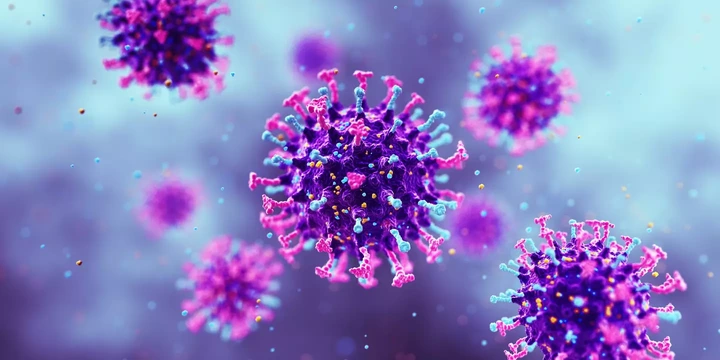HMPV is reported to produce symptoms that resemble those of a typical cold.

View pictures in App save up to 80% data.
Here’s what we know about the HMPV virus, as health professionals advise against socializing if you experience any symptoms.
A recent spike in cases of human metapneumovirus (HMPV) identified in China has left people around the world wondering if they should be rushing to the supermarket in order to panic buy toilet rolls and dried pasta to prepare for yet another lockdown.
However, there's no need to rush out and gather your emergency supplies just yet, as health experts have known about HMPV for several years - which means that it's low on the list of diseases likely to cause a pandemic.
Everyone can finally exhale in relief.

View pictures in App save up to 80% data.
HMPV, or Human Metapneumovirus, is a virus that primarily affects the respiratory system. It was first discovered in 2001 and is known to cause respiratory infections, particularly in children, the elderly, and individuals with weakened immune systems. HMPV can lead to symptoms similar to those of other respiratory viruses, including cough, fever, and difficulty breathing. While it often results in mild illness, it can sometimes lead to more severe respiratory complications, especially in high-risk populations. There is currently no specific antiviral treatment for HMPV, and management typically focuses on relieving symptoms.
First identified back in the Netherlands in 2001, HMPV is a virus which causes infections in the body's upper respiratory tract. Put simply, you get a cold.
The World Health Organization (WHO) states that while most individuals infected with HMPV experience only mild symptoms, there are cases where the illness can lead to significant health issues for certain individuals.
Human Metapneumovirus (HMPV) can present a variety of signs and symptoms similar to other respiratory infections. Common symptoms include: 1. **Cough** - Often persistent and can be dry or productive. 2. **Fever** - Mild to moderate fever may occur. 3. **Runny or Stuffy Nose** - Nasal congestion is common. 4. **Sore Throat** - Discomfort or pain in the throat. 5. **Wheezing** - A high-pitched whistling sound during breathing. 6. **Shortness of Breath** - Difficulty breathing can be experienced, especially in severe cases. 7. **Fatigue** - General tiredness and lack of energy. 8. **Headache** - Some individuals may experience headaches. 9. **Muscle Aches** - Generalized body aches may occur. Symptoms typically appear within 3 to 6 days after exposure and can last from a few days to several weeks, depending on the individual’s health and immune response. Severe cases may lead to bronchiolitis or pneumonia, particularly in young children, the elderly, or those with weakened immune systems. If you suspect an HMPV infection, it's important to consult a healthcare professional for proper diagnosis and management.
Being a member of the family that causes most common colds, it’s no shock that the symptoms of HMPV are quite similar to those of typical winter sniffles.
Common signs associated with HMPV include:
- cough
- fever
- sore throat
- runny or stuffy nose
- body ache
- headache

View pictures in App save up to 80% data.
In a smaller segment of the population, HMPV may result in additional health complications like pneumonia, bronchiolitis, or bronchitis. Individuals experiencing these conditions might show symptoms such as wheezing, dehydration, breathing difficulties, and fatigue.
The incubation period for Human Metapneumovirus (HMPV) typically ranges from 3 to 6 days. However, it can vary depending on the individual's immune response and other factors.
It's also understood the incubation period for HMPV is around three to six days.
The severity of HMPV can influence this, but it is quite similar to other respiratory viruses.
If you suspect that you may have Human Metapneumovirus (HMPV), here are some steps you can take: 1. **Monitor Symptoms**: Keep track of your symptoms, which may include cough, fever, nasal congestion, sore throat, and difficulty breathing. 2. **Consult a Healthcare Provider**: Schedule an appointment with your doctor or healthcare professional to discuss your symptoms and concerns. They may recommend tests or a physical examination. 3. **Practice Good Hygiene**: Wash your hands frequently, use hand sanitizer, and avoid close contact with others to prevent spreading the virus. 4. **Stay Hydrated and Rest**: Drink plenty of fluids and get adequate rest to help your body recover. 5. **Follow Medical Advice**: If diagnosed with HMPV, follow your healthcare provider's recommendations regarding treatment and management of symptoms. 6. **Seek Emergency Care if Necessary**: If you experience severe symptoms such as difficulty breathing, chest pain, or bluish lips or face, seek emergency medical attention immediately. Taking these steps can help you manage your health effectively if you suspect you have HMPV.
HMPV is transmitted from one individual to another via airborne particles, particularly in enclosed or limited areas. Additionally, it can spread when someone touches surfaces that have been contaminated and subsequently touches their eyes, nose, or mouth.
As a matter of common courtesy, it's important to maintain distance when you're unwell, cover your mouth when you cough or sneeze, and regularly wash your hands.
"If you have symptoms such as a high temperature, cough and feeling tired and achy, try to limit your contact with others, especially those who are vulnerable," Dr Watson previously told Sky News.

View pictures in App save up to 80% data.
"Currently, there are numerous viruses in circulation, including the flu. If you are experiencing symptoms of a respiratory illness and need to venture outside, we recommend that you think about wearing a face mask."
Is it possible that a lockdown could be implemented in response to an HMPV outbreak?
As things currently stand, no. Explaining the risk of HMPV causing a global pandemic or lockdown Virologist Dr Andrew Catchpole told The Vaccine Alliance: "Whilst HMPV does mutate and change over time with new strains emerging, it is not a virus that we consider to have pandemic potential.
"This occurs due to the gradual alterations in HMPV, which are influenced by strains that have circulated previously."
"Pandemics occur when a totally new virus enters the human population, like for Covid-19 when a totally new variant of the virus enters the human population by combination of a human and animal version of the virus."










